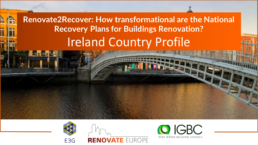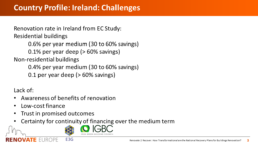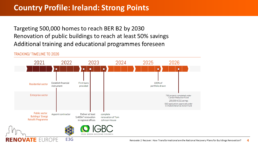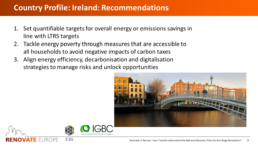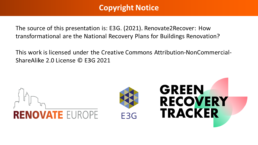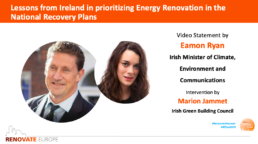NATIONAL SUPPORTING PARTNER OF THE CAMPAIGN

The IGBC is the leading authority on sustainable building in Ireland. With a network of over 180 member organisations from the entire value chain of the built environment, the IGBC is working to transform the Irish construction and property sector into a global leader in quality and sustainability.
For 2 years, IGBC worked in close cooperation with the Department of Communications, Climate Action and Environment (DCCAE) to build a community of experts and stakeholders to develop Ireland’s next National Renovation Strategy. This work, conducted as part of the H2020 funded Build Upon project, led to the publication of a “Declaration in 10 Points for a Better National Renovation Strategy“. The IGBC and its members are now working on the implementation of this strategy.
Our Vision
“A fully decarbonised built environment that delivers a better quality of life for all”
Check out IGBC’s Members here
Social Media and Website:
REDay2022 National Partner Event
20 October 2022, 13:00 - 14:00 IST (14:00 - 15:00 CET)
What do SME’s need to know, to be prepared for 2025?
Times are changing, particularly in the commercial sector for premises – large and small. As we take greater steps towards making our building stock more sustainable, renovation Policy and Legislation on the EU and National levels are upgraded. But what is most relevant for companies to keep an eye out for, what are the trends in the commercial sector and how do you prepare?
2021 - Renovate 2 Recover: How Transformational are the National Recovery Plans for Buildings Renovation?
National Recovery and Resilience Plans (NRRPs) present a unique opportunity to accelerate the delivery of deep renovation across the EU. The analysis of the NRRPs in this Study demonstrates that significant renovation activity is planned and will be made possible through the successive disbursements of the Recovery Funding. But these renovations must be done properly, and the money must be spent well. This unprecedented additional injection of public funds must set the EU building stock firmly on the path to achieving its Renovation Wave goals to 2030 and meeting the 2050 climate targets.
For NRRPs to be transformational towards achieving these goals, two key aspects need to be strengthened:
- Ensure funding delivers a step change towards realising deep (or staged deep) renovations, going well beyond the 30% minimum energy saving recommendation set by the European Commission.
- Invest in the right enabling framework, including leverage of private finance, to create sustainable renovation markets that will grow beyond 2026.
Irish profile from the study commissioned by the Renovate Europe Campaign and conducted by E3G with input from IGBC.
REDay2021 National Partner Event
15 October 2021, 10:00 - 12:00 IST (11:00 - 13:00 CET)
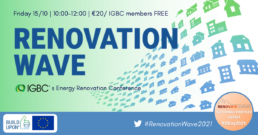
‘Renovation Wave’ is the Irish Green Building Council’s annual energy renovation conference. On the 10th anniversary of the Renovate Europe campaign, we will reflect on the progress that has been made over the last decade and what is needed to deliver on the renovation wave. Speakers include Adrian Joyce, Director of Renovate Europe Campaign and Ali Grehan, City Architect, Dublin.
REDay2020
REDay2020 looked at the place of building renovation in the National Recovery Plans. Listen below to the extract from REDay2020 on how Ireland is prioritising energy renovation in the National Recovery Plan:
In the context of Renovate Europe Day 2020, the Irish National Partner IGBC organised an online event entitled The Renovation Wave: Exploring links between EU Aims and Ireland’s National Actions
ADDITIONAL INFORMATION
- European Semester Country Specific Recommendations 2020
Deep Retrofit Programme – SEAI
The Deep Retrofit Pilot Programme was launched to investigate the technical, financial and behavioural challenges and opportunities that Deep Retrofit present and in turn inform policy options for potential future programmes. The Pilot Programme has two broad purposes:
- to offer grant support to make the upgrade of a home achievable and attractive to homeowners, and
- to incentivise the market to become involved in the delivery of an integrated, whole house solution to achieve an A rating and to be able to deliver at a reasonable scale.
The fundamental principles of the Pilot programme define ‘Deep Retrofit’ as follows:
- The home must achieve an A rating (< 75 kWh/m²/yr) from a starting point of C3 (> 200 kWh/m²/yr) or worse, which accounts for around 1 million homes in Ireland
- Efficiency first, i.e. improving the insulation and airtightness means much less energy is required to heat the house
- Airtightness must be no greater than 5 m³/hr/m² with a financial incentive for achieving ≤ 3 m³/hr/m²
- New heating technologies must be from a renewable source. Fossil fuel heating is not funded
- Requirement for mechanical ventilation to ensure good indoor air quality
Homes meeting these criteria are eligible to apply for a grant that pays 50% of the costs of the renovation. The pilot will ultimately inform the policies and measures that might be required for the large scale deeper retrofit of the poorer performing homes in Ireland by examining learnings from projects across the broad spectrum of house types in Ireland.
Principle Characteristics of the Incentive Programme:
| Type of Programme: | Incentive scheme to promote ambitious energy renovations of Irish homes |
| Year of initiation: | 2017 |
| Number of buildings: | 261 homes were renovated up to July 2019 |
| Measures implemented: | Wall, floor and roof insulation – Replacement of windows and doors – Airtightness measures – Heating systems running on renewable energy sources – Mechanical ventilation systems with demand control |
| Results: | Average energy savings of 36,600kWh per year per home – Average reduction of CO2 emissions of 10,160 kg CO2 equivalent per year per home |
| Energy performance: | Average energy savings of 87% were achieved |
| Cost of the works: | Average cost per home for the works €49,600 |
| Technical consultants: | Range of expertise required, including energy consultant to design works to achieve the A rating. Project Owners bring the relevant skills into the project team. Depending on the project, projects may also include input from architects, engineers, etc. |
Sustainable Energy Authority of Ireland website: https://www.seai.ie/
Irish government website ‘about’ section on SEAI: https://www.dccae.gov.ie/en-ie/energy/topics/State-Energy-Bodies/seai/Pages/SEAI.aspx
Report from March 2018 entitled Deep Energy Renovation of Traditional Buildings Addressing Knowledge Gaps and Skills Training in Ireland https://www.seai.ie/documents/research-projects/RDD-000155.pdf


